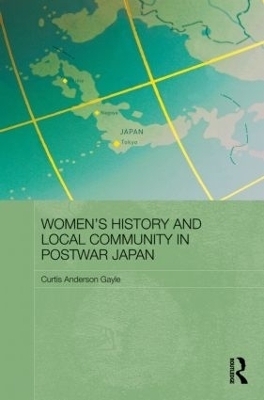
Women's History and Local Community in Postwar Japan
Seiten
2013
Routledge (Verlag)
978-0-415-86077-2 (ISBN)
Routledge (Verlag)
978-0-415-86077-2 (ISBN)
This book examines the emergence of women’s history-writing groups in Japan in the decade following the end of World War II and the way in which these versions of history-writing went on to subsequently eclipse and outlive those being offered by Marxist historians.
This timely look at a neglected corner of Japanese historiography spotlights the decade following the end of World War II, a time in which Japanese society was undergoing the transformation from imperial state to democratic nation. For certain working and middle-class women involved in education and labor activism, history-writing became a means to greater voice within the turbulent transition.
Women's History and Local Community in Postwar Japan examines the emergence of women’s history-writing groups in Tokyo, Nagoya and Ehime, using interviews conducted with founding members and analysis of primary documents and publications by each group. It demonstrates how women appropriated history-writing as a radical praxis geared less toward revolution and more toward the articulation of local imaginations, spaces and memories after World War II. By appropriating history as a praxis that did not need revolution for its success, these women used connections established by Marxist historians between history-writing and subjectivity, but did so in ways that broke rank from nationally-referenced renditions of history and memory. Under conditions in which some women saw history as a field of articulation that remained dominated by men, they put into practice their own de-centered versions of history-writing that continue to influence the historical landscape in contemporary Japan.
This timely look at a neglected corner of Japanese historiography spotlights the decade following the end of World War II, a time in which Japanese society was undergoing the transformation from imperial state to democratic nation. For certain working and middle-class women involved in education and labor activism, history-writing became a means to greater voice within the turbulent transition.
Women's History and Local Community in Postwar Japan examines the emergence of women’s history-writing groups in Tokyo, Nagoya and Ehime, using interviews conducted with founding members and analysis of primary documents and publications by each group. It demonstrates how women appropriated history-writing as a radical praxis geared less toward revolution and more toward the articulation of local imaginations, spaces and memories after World War II. By appropriating history as a praxis that did not need revolution for its success, these women used connections established by Marxist historians between history-writing and subjectivity, but did so in ways that broke rank from nationally-referenced renditions of history and memory. Under conditions in which some women saw history as a field of articulation that remained dominated by men, they put into practice their own de-centered versions of history-writing that continue to influence the historical landscape in contemporary Japan.
Curtis Anderson Gayle is an Associate Professor in the Faculty of Integrated Arts & Social Sciences at Japan Women’s University, in Tokyo. He is the author of Marxist History and Postwar Japanese Nationalism (Routledge 2002) and specializes in modern Japanese history and comparative culture.
1. Introduction 2. Rewriting Local History in the Aftermath of World War II 3. Women’s History in the Center: The Tokyo Josei-shi Kenkyukai 4. Kyodo-shi in Nagoya: fusing local pasts and presents 5. Chi’iki Stirrings in Ehime 6. the Ehime Women’s History Circle 7. Local Women’s History in Contemporary Focus
| Reihe/Serie | Routledge/Asian Studies Association of Australia ASAA East Asian Series |
|---|---|
| Zusatzinfo | 2 Line drawings, black and white; 2 Illustrations, black and white |
| Verlagsort | London |
| Sprache | englisch |
| Maße | 156 x 234 mm |
| Gewicht | 453 g |
| Themenwelt | Geschichte ► Allgemeine Geschichte ► Zeitgeschichte |
| Geisteswissenschaften ► Geschichte ► Geschichtstheorie / Historik | |
| Geisteswissenschaften ► Geschichte ► Regional- / Ländergeschichte | |
| Sozialwissenschaften ► Soziologie ► Spezielle Soziologien | |
| ISBN-10 | 0-415-86077-6 / 0415860776 |
| ISBN-13 | 978-0-415-86077-2 / 9780415860772 |
| Zustand | Neuware |
| Informationen gemäß Produktsicherheitsverordnung (GPSR) | |
| Haben Sie eine Frage zum Produkt? |
Mehr entdecken
aus dem Bereich
aus dem Bereich
Gewalt, Umwelt, Identität, Methode
Buch | Softcover (2024)
Spector Books OHG (Verlag)
CHF 49,95
wie Freud im Kollektiv verschwand
Buch | Hardcover (2024)
Klett-Cotta (Verlag)
CHF 34,95


